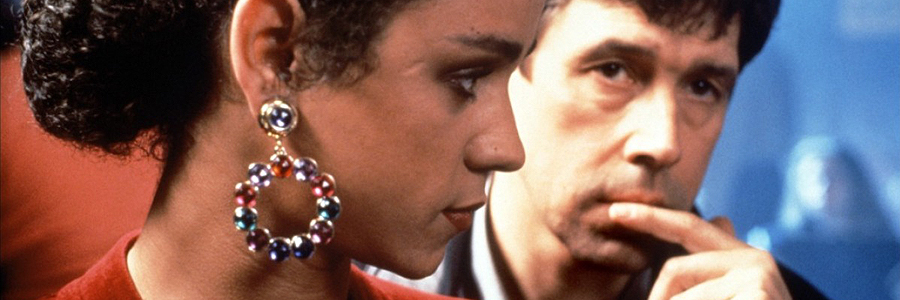
The Crying Game
Miramax Films
Original release: October 30th, 1992
Running time: 112 minutes
Writer and director: Neil Jordan
Composer: Anne Dudley
Cast: Jaye Davidson, Stephen Rea, Miranda Richardson, Forest Whitaker, Jim Broadbent
The Scorpion and the Frog 01:41:24 to 01:47:24
Deconstructing Cinema: One Scene At A Time, the complete series so far
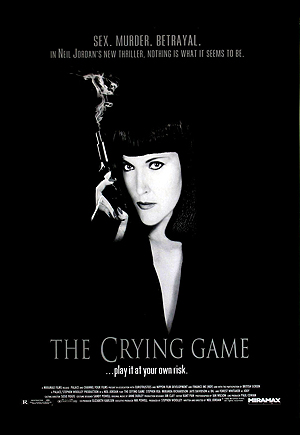
French existentialist philosopher Jean-Paul Sartre once said our existence precedes essence and at times I can’t help but agree with him. His philosophy is perhaps the one I’ve followed the closest in the years since my introduction to philosophy in general, but there’ve times when I’ve found myself doing that very thing René Descartes did. I too have occasionally doubted everything.
When Sartre talked about “essence” what he was referring to was our past. Our existence is a necessary requirement for our essence; first we must “be” in order to “be something”. Existentialism denies that there’s any real human nature because there’s no God to have any conception of it. While this places the responsibility of our lives in our hands I know I’ve had moments when I’ve felt an urge to do something that was…unwise…simply because I wanted to and justifying it with the phrase “it’s my nature” – thus going against all my previous existential leanings.
It was only while watching Neil Jordan’s The Crying Game for the first time recently that it struck me maybe I really do believe in human nature after all. Why else would I have been so moved by the retelling of the story The Scorpion and the Frog, which occurs twice during the film?
Borrowing elements usually associated with the stylistic film noirs of the 40s and 50s, The Crying Game, originally conceived in 1982 under the title The Soldier’s Wife and then shelved, is both a thriller and a deeply emotional drama that unfolds against the backdrop of an IRA kidnapping. At the start of it we see Jody (Forest Whitaker), a black British soldier, being lured by Jude (Miranda Richardson) to a secluded spot with the promise of sex, but he’s instead ambushed by Maguire (Adrian Dunbar) and Fergus (Stephen Rea) who kidnap him. They hope they can use Jody as an exchange for one of their soldiers who’s been taken by British forces, but they’re also aware they might have to kill him if things don’t go according to plan.
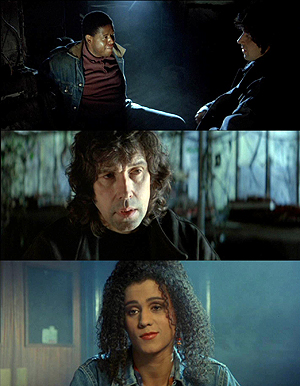
Despite knowing this, Fergus and Jody start to form a friendship, a sort of Stockholm syndrome during which the prisoner tells his captor about Dil (Jaye Davidson), a hairdresser in London, and makes him promise that if he’s killed he’ll visit her and let her know he was thinking of her. Despite his somewhat childish nature, Jody knows his captors are going to kill him. When Fergus angrily asks what does he know about their nature, Jody tells him the story about the Scorpion and the Frog.
Scorpion wants to cross a river, but he can’t swim. Goes to the frog, who can, and asks for a ride. Frog says, “If I give you a ride on my back, you’ll go and sting me.” Scorpion replies, “It would not be in my interest to sting you since as I’ll be on your back we both would drown.” Frog thinks about this logic for a while and accepts the deal. Takes the scorpion on his back. Braves the waters. Halfway over feels a burning spear in his side and realizes the scorpion has stung him after all. And as they both sink beneath the waves the frog cries out, “Why did you sting me, Mr. Scorpion, for now we both will drown?” Scorpion replies, “I can’t help it, it’s in my nature.”
After Jody’s death we then see Fergus trying to lose himself in London and forget about his IRA dealings, but the image of his friend haunts him and he tries to honour his request. Upon meeting Dil, Fergus is visibly infatuated by this alluring, mysterious and effortlessly confident being, but he has no idea how much 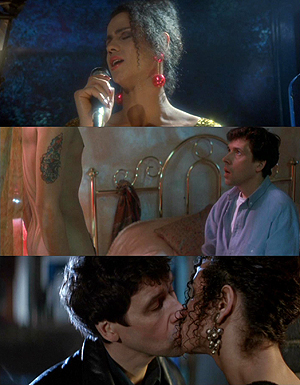
his encounter with her will force him to question his own identity. As The Crying Game continues to unfold, it does so in some of the most beautiful and memorable ways thanks to its flawless script, direction, score and performances by Davidson and Rea.
If you concentrate on the film’s famous twist you might forget some of the great moments The Crying Game has, such as the flirtatious conversation between Dil and Fergus in the Metro bar via its barman Col (Jim Broadbent), the way Dil commands her audience during her rendition of Dave Berry’s song The Crying Game and Jude’s eagerly awaited comeuppance in the nail-biting climax.
Though commonly referred to as film about gender-bending, an interracial relationship and the tense politics that exists between Britain and Ireland, The Crying Game is really a film about people who remain true to their natures. This idea is further encapsulated in the film’s epilogue when Fergus relates Jody’s story about the Scorpion and the Frog to Dil, having come to recognise and accept his own nature. As Brian Eggert writes:
Though there’s a lot going on in The Crying Game, it’s this idea about human nature that’s remained in my mind in the days after seeing the film. Perhaps it was an idea already there, only brought forward by the visceral experience Jordan’s film offers, but it made me think about whether or not my existence precedes my essence or if it’s the other way around.
There’s a lot of food for thought in these 112 minutes, but for the way it handles these complex themes of human nature and identity (both national and sexual), The Crying Game is easily one of the most rewarding films of the 90s. We don’t see a lot of these stories being told anymore in cinemas today, despite our yearnings for them.
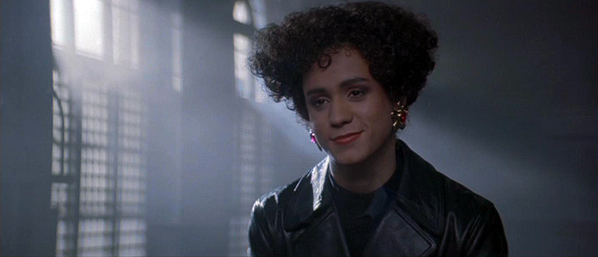

Patrick Samuel
The founder of Static Mass Emporium and one of its Editors in Chief is an emerging artist with a philosophy degree, working primarily with pastels and graphite pencils, but he also enjoys experimenting with water colours, acrylics, glass and oil paints.
Being on the autistic spectrum with Asperger’s Syndrome, he is stimulated by bold, contrasting colours, intricate details, multiple textures, and varying shades of light and dark. Patrick's work extends to sound and video, and when not drawing or painting, he can be found working on projects he shares online with his followers.
Patrick returned to drawing and painting after a prolonged break in December 2016 as part of his daily art therapy, and is now making the transition to being a full-time artist. As a spokesperson for autism awareness, he also gives talks and presentations on the benefits of creative therapy.
Static Mass is where he lives his passion for film and writing about it. A fan of film classics, documentaries and science fiction, Patrick prefers films with an impeccable way of storytelling that reflect on the human condition.
© 2022 STATIC MASS EMPORIUM . All Rights Reserved. Powered by METATEMPUS | creative.timeless.personal. | DISCLAIMER, TERMS & CONDITIONS
HOME | ABOUT | CONTACT | TWITTER | GOOGLE+ | FACEBOOK | TUMBLR | YOUTUBE | RSS FEED
CINEMA REVIEWS | BLU-RAY & DVD | THE EMPORIUM | DOCUMENTARIES | WORLD CINEMA | CULT MOVIES | INDIAN CINEMA | EARLY CINEMA
MOVIE CLASSICS | DECONSTRUCTING CINEMA | SOUNDTRACKS | INTERVIEWS | THE DIRECTOR’S CHAIR | JAPANESE CINEMA





